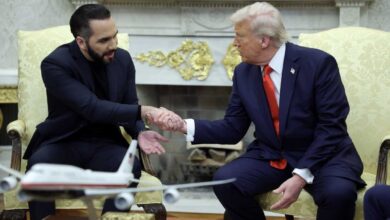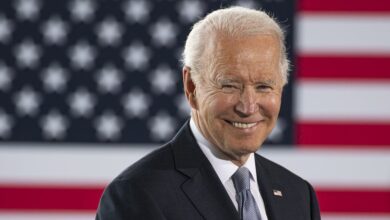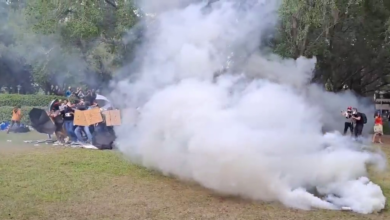Netanyahu’s U.S. Visit: A Strategic Win for Both Parties
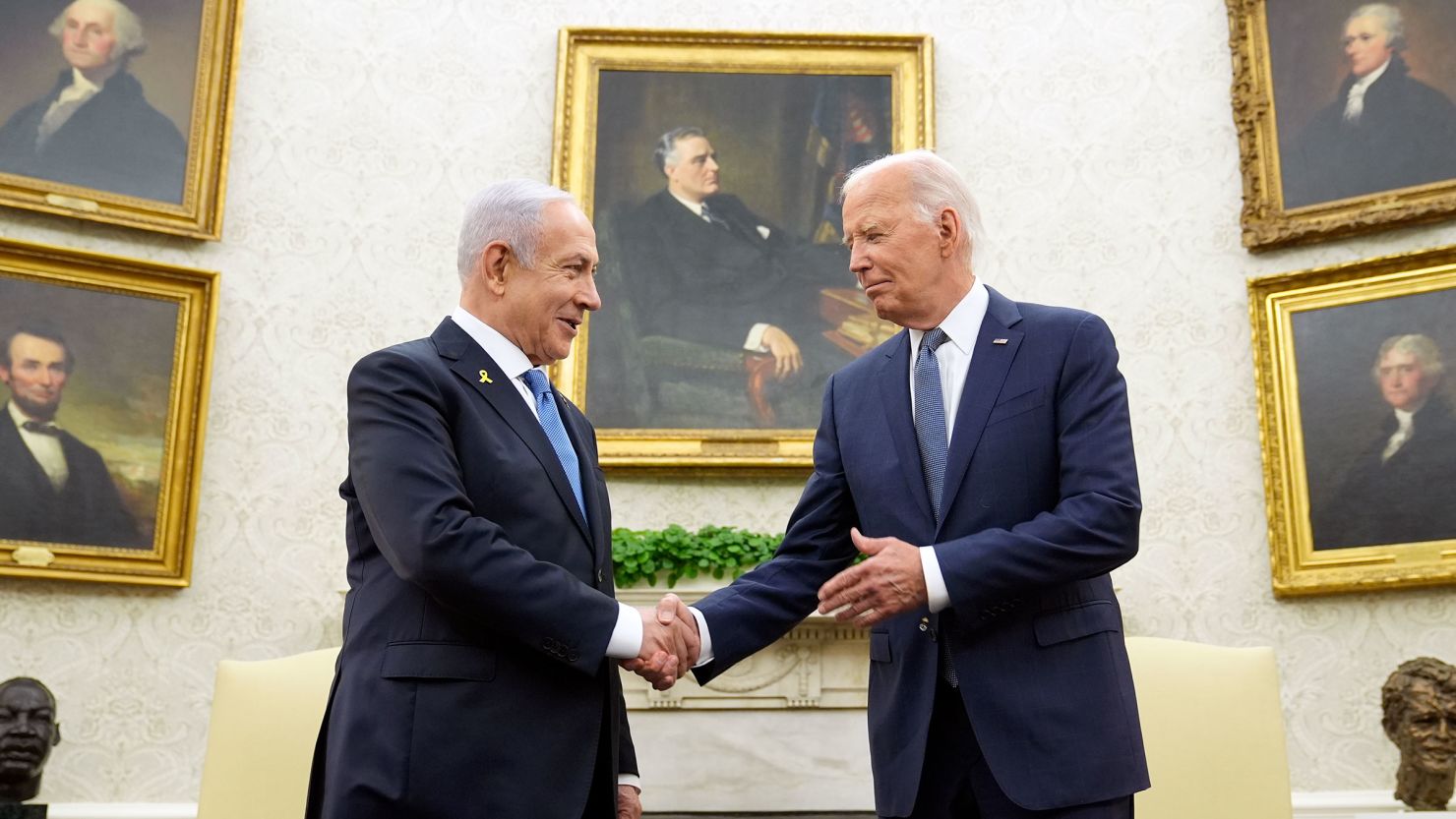
WASHINGTON (WE) — In a high-stakes effort to negotiate a ceasefire in Gaza, U.S. President Joe Biden and Israeli Prime Minister Benjamin Netanyahu met at the White House on Thursday during Netanyahu’s U.S. visit. This meeting followed a day of heightened tension, marked by Netanyahu’s emphatic speech to Congress and significant protests from pro-Palestinian demonstrators.
Background of the Meeting and Personal Ties
The Israel-Gaza conflict, now in its ninth month, has put Netanyahu under intense pressure domestically and internationally. Thousands of pro-Palestinian protestors gathered outside the Capitol as Netanyahu addressed Congress, underscoring the urgency of the situation.
Netanyahu, who has known Biden for 40 years, acknowledged the President’s long-standing support for Israel. “From a proud Jewish Zionist to a proud Irish-American Zionist, I want to thank you for 50 years of public service and 50 years of support for the state of Israel,” he remarked, highlighting their deep personal and professional connection.
Discussion Points and Key Issues
At the White House, national security spokesman John Kirby outlined the critical topics of discussion between Biden and Netanyahu. These included the urgent need for a hostage release deal, the potential for conflict to spread to Lebanon, the threat posed by Iran, and the necessity of reaching compromises in peace talks.
Despite acknowledging existing “gaps” in the U.S.-Israel relationship, Kirby emphasized that the relationship remains “healthy,” noting that disagreements are a normal part of their dynamic.
Private Meetings
Biden and Netanyahu also met privately with the families of seven U.S. citizens held hostage by Hamas in Gaza. Jonathan Dekel-Chen, whose son was kidnapped, described the meeting as “productive and honest,” expressing cautious optimism.
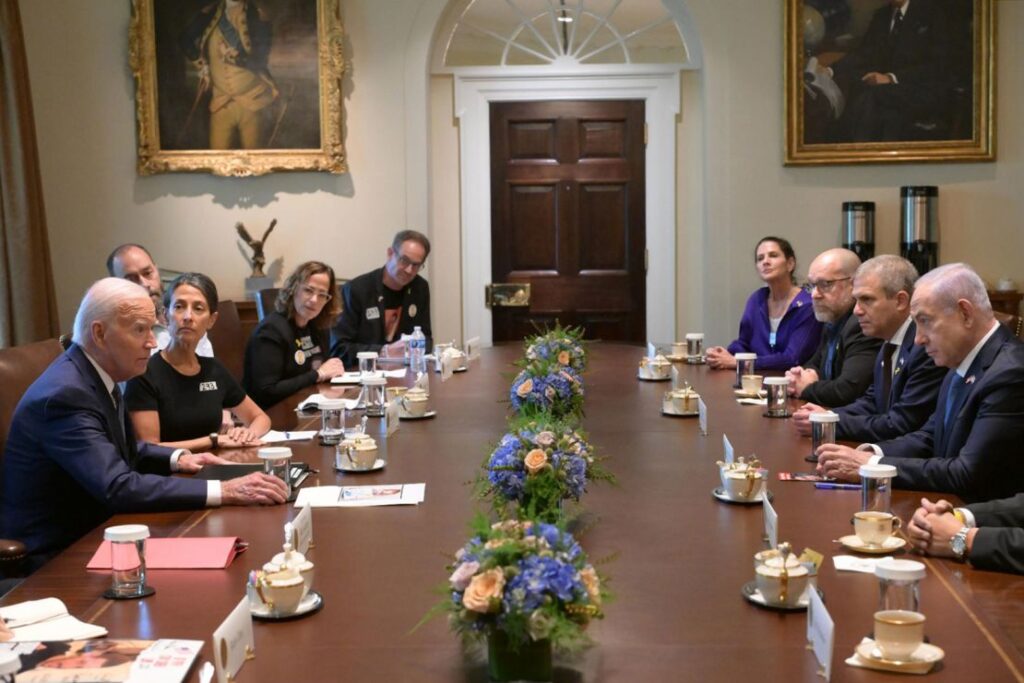
Prime Minister Benjamin Netanyahu’s recent visit to the United States has garnered significant attention, serving as a potential strategic advantage for both the Democratic and Republican parties. This visit comes amidst heightened tensions in the ongoing Israel-Gaza conflict, now in its ninth month, and a backdrop of domestic and international scrutiny.
Democratic Perspective: Navigating Internal Divisions and Public Opinion
For the Democrats, Netanyahu’s U.S. visit presents both challenges and opportunities. President Joe Biden’s administration has maintained strong support for Israel, a stance that has been politically divisive within the party. Progressive Democrats have been vocal critics of U.S. military aid to Israel, particularly in light of the prolonged conflict in Gaza. This faction views Netanyahu’s hardline policies as counterproductive to peace efforts and detrimental to Palestinian human rights.
However, the meeting between Biden and Netanyahu, emphasizing long-standing bilateral ties and mutual security interests, aims to reassure moderate and pro-Israel constituents within the Democratic Party. By addressing key issues such as the urgent need for a Gaza ceasefire, the threat of Iranian influence, and regional stability, Biden seeks to project a balanced approach that underscores U.S. commitment to Israel’s security while advocating for diplomatic resolutions.
Republican Perspective: Reinforcing a Strong U.S.-Israel Alliance
For the Republicans, Netanyahu’s U.S. visit is an opportunity to reinforce their traditional support for Israel, a cornerstone of their foreign policy platform. Netanyahu’s alignment with former President Donald Trump, who is also set to meet with the Israeli Prime Minister at his Mar-a-Lago residence, highlights the deep connections between Republican leadership and Israeli right-wing policies.
Republicans have consistently criticized the Biden administration for what they perceive as insufficiently robust support for Israel. Netanyahu’s visit allows Republican leaders to contrast their unwavering backing of Israel with the Democrats’ more nuanced approach, aiming to galvanize their base ahead of the upcoming elections. This narrative is further bolstered by Netanyahu’s strong rhetoric in Congress, where he received significant applause, predominantly from Republican lawmakers.
Read More: Netanyahu’s U.S. Visit: A Strategic Win for Both Parties
Biden Drops Out of 2024 Race: Harris Endorsed, Trump Reacts
COVID-19 Virus Alert: 7 States Hit ‘Very High’ Levels
Hunter Biden’s Trial Commences on Federal Firearms Charges
Public and Political Reactions
The visit has sparked considerable public and political reactions. Thousands of pro-Palestinian protesters demonstrated outside the Capitol during Netanyahu’s speech, reflecting widespread discontent with the Israeli government’s actions in Gaza. The protests underscore the domestic challenges faced by both parties in addressing a conflict that evokes strong emotions and diverse opinions among American voters.
National security spokesman John Kirby’s remarks, acknowledging “gaps” in the U.S.-Israel relationship while emphasizing its overall health, illustrate the Biden administration’s attempt to navigate a complex diplomatic landscape. The administration’s engagement with hostage families and focus on humanitarian concerns aim to present a compassionate and pragmatic approach to the conflict.
Netanyahu’s congressional speech, where he condemned pro-Palestinian protesters as “Iran’s useful idiots,” was met with applause primarily from Republicans. However, the White House distanced itself from this characterization, describing the protests as “mostly peaceful.”
The protests, significant in size and intensity, resulted in 23 arrests, including five inside the Capitol. Demonstrators accused Netanyahu of war crimes, reflecting deep divisions in U.S. public opinion on the conflict.
Vice President Harris and Democratic Party Divisions
Vice President Kamala Harris, viewed as the presumptive Democratic nominee following Biden’s announcement to step down, did not attend Netanyahu’s speech due to other commitments. Harris has publicly supported Israel, a stance that has proven politically challenging given the rifts within the Democratic Party over U.S. support for Israel.
One of the best moments of Benjamin Netanyahu's historical speech yesterday:
— Vivid.🇮🇱 (@VividProwess) July 25, 2024
"For nearly 4,000 years, the land of Israel has been the homeland of the Jewish people. It has always been our home, and it will always be our home!"
🇮🇱 pic.twitter.com/Y0PO1vKd12
Looking Ahead
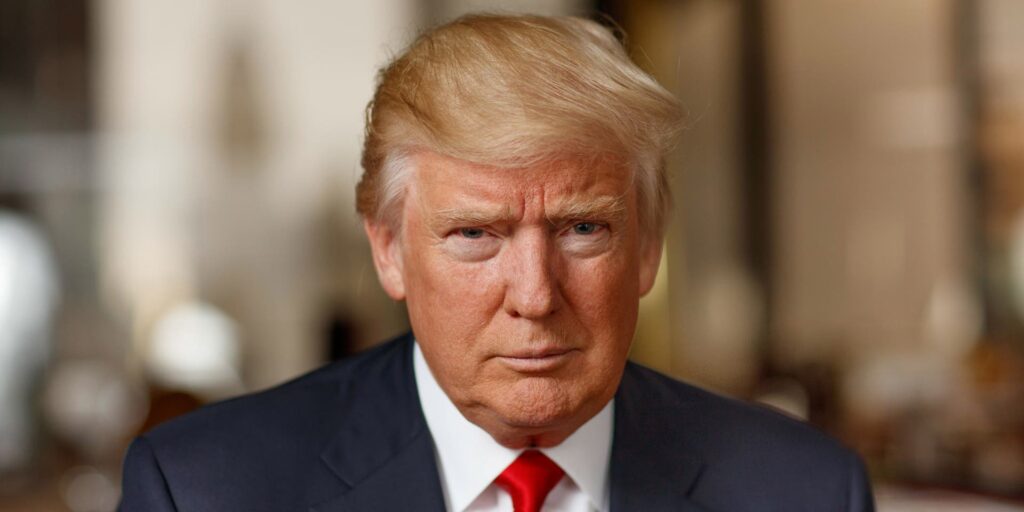
Netanyahu’s U.S. visit continues with a planned meeting with Republican presidential nominee Donald Trump at his Mar-a-Lago residence in Florida. This ongoing dialogue highlights the complexity and urgency of finding a resolution to the Gaza conflict.
Netanyahu’s U.S. visit serves as a diplomatic litmus test for both the Democratic and Republican parties. While it highlights the enduring U.S.-Israel alliance, it also exposes the deep-seated political and ideological divisions within American politics regarding the Israeli-Palestinian conflict. As both parties leverage the visit to their strategic advantage, the broader implications for U.S. foreign policy and Middle East peace efforts remain a critical point of consideration.




